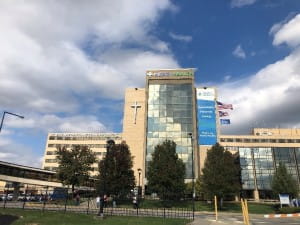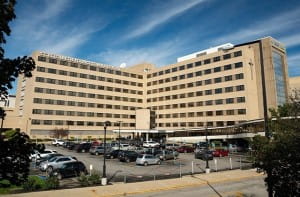Rotations and Curriculum — Pharmacy Residency at St. Elizabeth Youngstown Hospital
Facilities
St. Elizabeth Youngstown Hospital
 |
 |
Rotation Schedule
Required learning experiences (three to seven weeks):
- Orientation to Residency and Hospital Practice
- Practice Management
- Internal Medicine
- Transition of Care/Decentralized Pharmacy Services
- Critical care (two months required)
- Critical Care (ICU required)
- St. Elizabeth Youngstown Hospital MICU
- St. Elizabeth Boardman Hospital ICU
- Critical Care (SICU)
- Emergency Medicine (required)
- St. Elizabeth Youngstown Hospital
- St. Joseph Warren Hospital
- Advanced Adult Medicine (with pharmacy student preceptorship)
- Clinical Services (pharmacy consultation service)
- Hospital Formulary and Policy Management
- Hospital Practice
- Medication Safety/Management
- Pharmacy/Family Medicine Clinic
- Residency Project
- Consistent with other residency programs, residents are required to design and conduct a major project throughout the year
- Teaching and Education (including teaching certificate program)
- Opportunities are available to participate in the education of:
- Pharmacy students
- Resident physicians
- Other health care professionals
- When you participate in the teaching certificate program, you’ll be given a title of clinical instructor at the Northeast Ohio Medical University’s College of Pharmacy
- Provides an opportunity to improve didactic, small group and experiential teaching skills
- Resident will have access to the university’s intranet, course management system and extensive library resources
- Opportunities are available to participate in the education of:
Elective learning experiences (three to four weeks):
The resident may choose one physician co-precepted elective rotation. Flexibility exists to create additional electives based on resident interest. Up to one month of elective time may be used for residency project implementation/completion, if necessary, for the project and approved by the residency program director.
Pharmacist precepted:
- Anticoagulation clinic
- Hematology Oncology
- Population Health (facilitated through BSMH Population Health)
- Emergency Medicine (elective)
- St. Elizabeth Youngstown Hospital
- St. Joseph Warren Hospital
- Critical Care (ICU elective)
- St. Elizabeth Youngstown Hospital
- St. Elizabeth Boardman Hospital
- St. Joseph Warren Hospital
Physician co-precepted:
- Cardiology
- Infectious disease
- Trauma service
Research and Scholarly Activity
Residents complete several required longitudinal projects throughout the residency year. Residents are required to design and conduct a major research project throughout the year, including the writing of a final manuscript. Research will be presented in several forums throughout the year, including the ASHP Midyear meeting, the Ohio Pharmacy Residency Conference (OPRC), and Mercy Health Youngstown Resident Research Day. Additionally, the residents complete at least one Medication Use Evaluation (MUE), complete one formulary drug monograph which is presented at the local and enterprise-wide P&T, write one policy or guideline, and complete one newsletter article for local or regional publication.